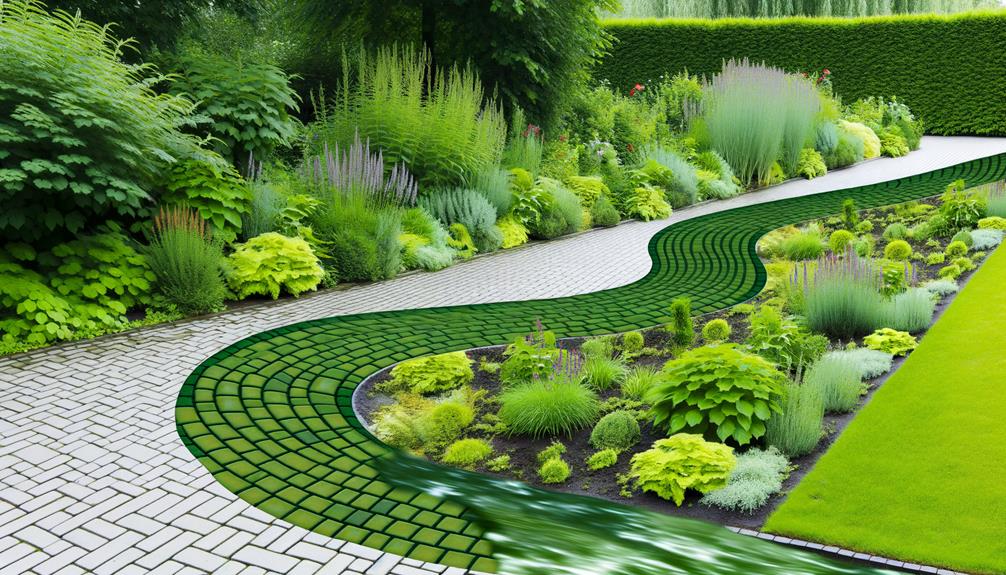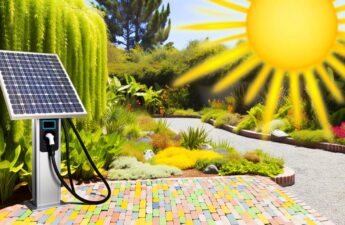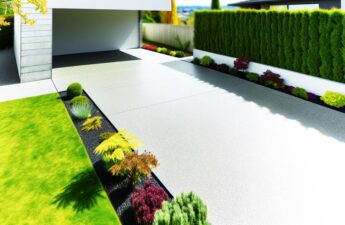As you pull into your driveway after a long day, imagine the satisfaction of knowing that your choice of sustainable and eco-friendly design is not only benefiting the environment but also contributing to a healthier and greener future.
But why should you choose these designs over traditional ones? Well, the answer lies in the numerous advantages they offer.
By conserving natural resources, reducing carbon emissions, and improving water management, sustainable driveway designs not only enhance the visual appeal of outdoor spaces but also add value to your property.
But that's not all. There's more to explore and discover about the exciting world of sustainable and eco-friendly driveways.
The Drawbacks of Traditional Driveway Materials
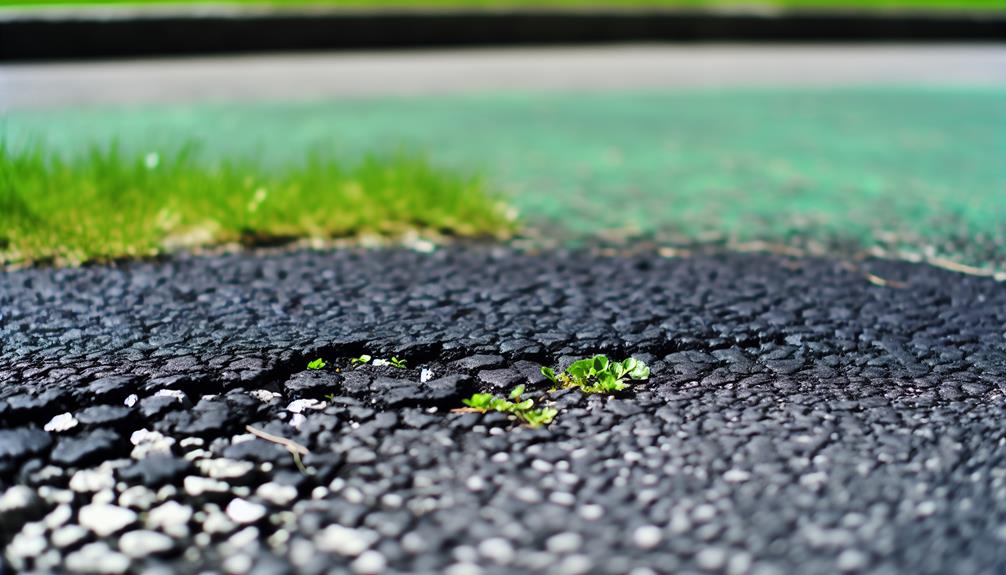
Traditional driveway materials have several drawbacks that can negatively impact the environment and require regular maintenance. When it comes to sustainable and eco-friendly driveway designs, it's important to consider the materials used.
Traditional options like concrete and asphalt have been widely used for driveways, but they come with their fair share of environmental concerns. Concrete driveways, for example, contribute to excessive stormwater runoff, which can lead to water pollution. Additionally, the production of concrete involves large amounts of carbon dioxide emissions, contributing to global warming.
On the other hand, asphalt driveways have their own set of issues. The dark color of asphalt absorbs and radiates heat, thereby contributing to the heat island effect. Moreover, regular maintenance is required for asphalt driveways, which can be time-consuming and costly. Not to mention, the production of asphalt also emits harmful chemicals.
To address these concerns, sustainable and green alternatives have emerged. Permeable paving, for instance, allows rainwater to infiltrate the ground, reducing stormwater runoff and improving water quality. Recycled asphalt is another option, which reduces the need for new materials and helps divert waste from landfills. Additionally, using porous materials in driveway construction enables water to seep through, minimizing runoff and promoting groundwater recharge.
Eco-Friendly Alternatives for Driveways
Consider sustainable and eco-friendly alternatives when choosing materials for your driveway. By opting for these options, you can have a positive impact on the environment and reduce your carbon footprint.
One option to consider is using recycled asphalt pavement (RAP). RAP is made from reclaimed asphalt, reducing the need for new materials and conserving natural resources.
Another eco-friendly choice is porous paving, which allows water to infiltrate the soil, reducing stormwater runoff and preventing erosion and flooding.
Permeable pavers are another great option as they also allow water to seep into the ground naturally, reducing runoff and filtering pollutants.
Green driveways, such as gravel driveways, offer multiple benefits. They allow rainwater to seep into the ground naturally, are cost-effective, and have lower heat absorption, reducing the heat island effect.
Porous asphalt is another eco-friendly alternative that allows water to penetrate through, reducing runoff and filtering pollutants.
Additionally, sustainable materials like natural stone and grass pavers not only offer durability and longevity but also contribute to stormwater management and improve water management.
Sustainable Materials Redefining Driveways
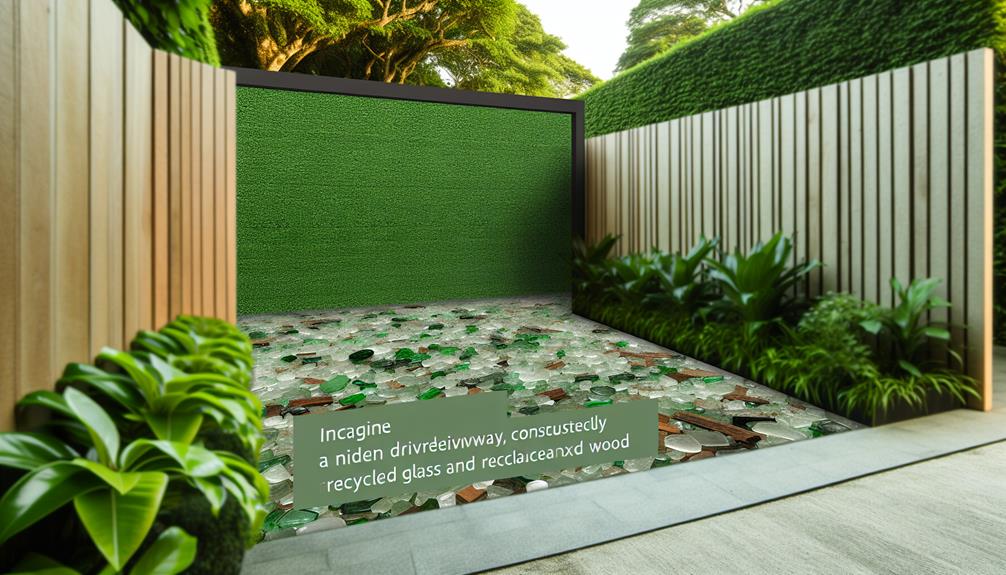
By choosing sustainable materials for your driveway, you can redefine its environmental impact and contribute to a greener future. Green driveways offer an environmentally conscious solution by reducing runoff and promoting better water management.
One sustainable driveway option is the use of recycled asphalt pavement (RAP). This material provides durability and weather resistance while significantly reducing the consumption of new aggregates and energy during production.
Pervious concrete is another sustainable alternative that allows water to seep through, preventing stormwater runoff and reducing the risk of erosion and flooding. Similarly, permeable concrete is designed to promote water infiltration, supporting better water management and reducing the heat island effect.
By using these sustainable alternatives, you can actively contribute to the preservation of natural resources and minimize the environmental impact of your driveway. Additionally, porous asphalt is a popular choice for sustainable driveways as it allows water to penetrate the surface and replenish the groundwater supply.
These materials not only provide a functional and visually appealing driveway but also support sustainability in the construction industry.
Porous Paving Solutions
Porous paving solutions offer an innovative and sustainable approach to driveway design, allowing water to infiltrate the ground and reducing runoff. There are several types of porous paving options available, including permeable concrete, permeable asphalt, and resin-bound paving. Permeable concrete and asphalt have gaps or additives that create tiny voids, while resin-bound paving is made by mixing natural aggregates with a clear resin binder.
Choosing a porous paving option for your driveway isn't only environmentally friendly but also helps to reduce your carbon footprint. These paving solutions are made using recycled materials, such as recycled asphalt or reclaimed asphalt pavement (RAP), which helps to minimize waste and conserve resources. Additionally, some types of porous paving, like grass pavers, are made from recycled plastic, further contributing to sustainable practices.
One of the major advantages of porous paving is its ability to manage water runoff effectively. The permeable surfaces allow rainwater to infiltrate into the ground, preventing excessive runoff and reducing the risk of flooding. This helps to improve water management and prevent water pollution by allowing the natural filtration and absorption processes to occur.
In addition to its environmental benefits, porous paving also offers durability and low maintenance. These paving options are designed to withstand heavy traffic and harsh weather conditions, making them a long-lasting choice for your driveway. By choosing a porous paving solution, you can create a green driveway option that isn't only aesthetically pleasing but also contributes to a more sustainable and eco-friendly lifestyle.
Exploring Environmentally Friendly Substitutes for Conventional Driveways
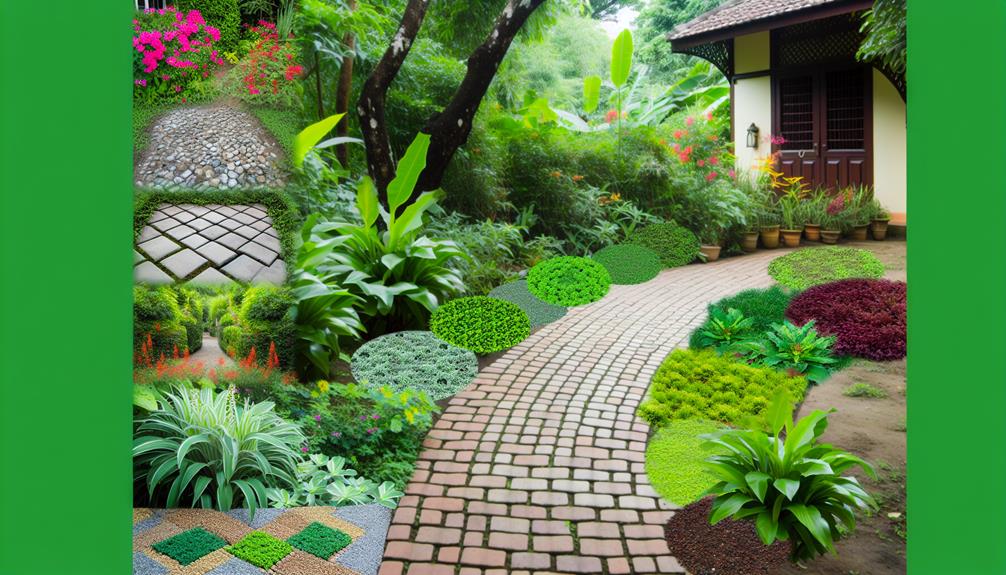
To continue exploring sustainable and eco-friendly driveway designs, let's now turn our attention to environmentally friendly substitutes for conventional driveways.
One option is using recycled asphalt, which not only reduces the demand for new materials but also helps manage water effectively. Water is a precious resource, and conventional driveways can contribute to water pollution and stormwater runoff. By choosing recycled asphalt, you can minimize these issues while still having a durable and low-maintenance driveway.
Another environmentally friendly choice is grass pavers. These pavers allow rainwater infiltration, reducing the urban heat island effect and promoting groundwater recharge. They also provide a natural and aesthetically pleasing alternative to traditional concrete driveways.
Speaking of concrete, it's worth mentioning that sustainable options exist in this realm as well. Concrete made with recycled materials is becoming increasingly popular. This not only diverts waste from landfills but also reduces the energy consumption associated with concrete production.
